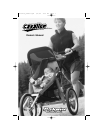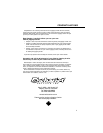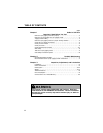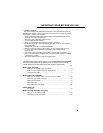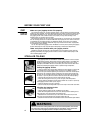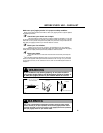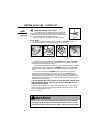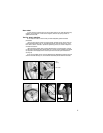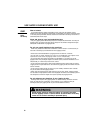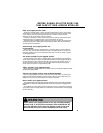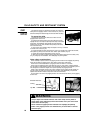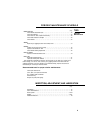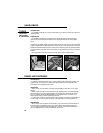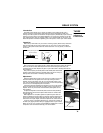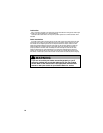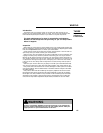
5
Make sure your jogging stroller is in proper working condition.
Spend a few moments before each walk to check your jogging stroller’s systems against
the following checklist:
Check that your wheels are straight.
Spin each wheel to check that the rim doesn’t wobble up and down or from side
to side, and that the wheels are centered in the jogging stroller frame and fork. To do this,
watch the rim as it passes through the brake pads, or by the frame. If any wheel fails this
test, take your jogging stroller to your Chariot dealer for service.
Check your tire inflation.
Inflate your tires to the air pressure recommended on the tire sidewalls.
Use a hand-operated pump with an appropriate gauge. Gas station hoses inflate the jogging
stroller tires too rapidly and the pressure they indicate is often inaccurate.
Check your brake.
Press the brake lever to make sure that the brake moves freely and stops the
jogging stroller.
The brake pads should be adjusted so they are 1 to 2 mm away from the rim when the
brakes are not applied. Brake pads should be centered on the rim (Fig. 4). If your brakes
are too tight, too loose, or not centered on the rim, refer to the Brake System section of
Chapter 3.
BEFORE EVERY USE – CHECKLIST
WARNING
This is not a comprehensive maintenance program. Check the entire jogging
stroller carefully. If you spot a problem, do not use the jogging stroller until it
has been corrected. If you are not certain if your jogging stroller has a problem,
take your jogging stroller to your Chariot dealer.
WARNING
If your brakes are not working properly, do not place a child in
your jogging stroller. Refer to the Brake System section of Chapter 3
or take your jogging stroller to your Chariot dealer for service.
❐
✓
❐
✓
❐
✓
Pad and rim should be
parallel
Brake pad aligned with
the rim surface
Direction of rim
rotation
Fig. 4
0.5 - 1mm toe in



